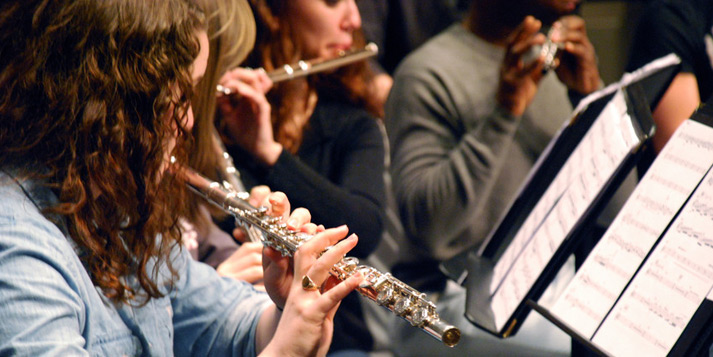Woodwinds

The Department of Music offers students the opportunity to study with gifted, nationally and internationally recognized faculty while pursuing their undergraduate or graduate music degrees.
Undergraduate students may choose to pursue a Bachelor of Arts degree in Music, the Bachelor of Music in Music Education, or a Bachelor of Music degree. Students choosing a career path in the Bachelor of Music degree may specialize in one or more areas of emphasis: music composition, music performance, music theory, or the Bachelor of Music degree with elective studies in business.
Master of Music students can pursue emphases in composition, instrumental conducting, instrumental performance, music education, music history, or theory.
Graduate students who have completed an MA Degree or its equivalent have the opportunity to further develop their musical skills in a performance-intensive program culminating in a Graduate Certificate in Advanced Performance.
Undergraduate Auditions
All students must satisfy an entry audition into the Department of Music. Details on this process, including applying to the Department, can be found at the Auditions and Admissions page.
In preparation for the audition you will need to choose two excerpts of contrasting style that best represent your highest technical and musical achievement. Movements of a sonata, concerto or other standard solo repertoire are preferred. Students should also be prepared to perform from memory the chromatic and all major scales. In addition, a sight-reading excerpt will be required during the audition.
Because of limited space, each professor may only be able to accept a select number of students into their studio each year. Your preparation for the audition is vital to your success.
We look forward to hearing you play for us. Thank you for including us in your musical journey.
Graduate Auditions for Master of Music Degree or Certificate in Advanced Performance
The choice to pursue musical studies at the graduate level is an important decision in the continuing development of a musician’s skill. We welcome the opportunity to assist you and encourage you to make careful preparation for your audition/interview. This process is vital to your success.
Flute Auditions
- Prepare three to four contrasting selections, such as individual movements from sonatas, concertos, or other solo works that demonstrate your artistic and programming values. Performing with piano is not required.
- Three contrasting orchestral excerpts
- Scales, Full Range (Major, Minor. (All Forms), Chromatic)
- Sight-Reading
For full consideration of admission to the Flute Studio, applications to the Graduate School and the Department of Music should be submitted on or before December 1st.
For questions regarding audition repertoire, or to set up a lesson before your audition day, please contact Dr. Cristina Ballatori.
Oboe Auditions
Candidates should prepare one concerto movement from a composer such as Vaughan Williams, Mozart, Marcello, Bellini, etc. and one work or sonata movement from a composer such as Hindemith, Saint-Saens, Jacob, Bozza, etc.
Candidates will also be expected to play all major and minor scales and sight-read a brief excerpt.
Clarinet Auditions
Candidates should be prepared to play two solo movements of contrasting styles from the major Concerto, Sonata, or Solo repertoire.
Bassoon Auditions
Candidates should prepare two contrasting movements from solo repertoire or etudes (i.e. etudes of Milde-concert studies, Piard, Orefici; works of Bozza, Galliard, Saint-Saens, Tansman, Telemann; or concertos of Mozart, Hummel, Vivaldi, Weber). In addition candidates are expected to play two standard orchestral excerpts and major and minor scales.
Saxophone Auditions
Prescreening:
Record a 10 to 20 minute program with or without piano accompaniment demonstrating your programming and artistic values. Submitting separate recordings of movements/works is allowed.
For full consideration of admission to the saxophone studio, applications to the Graduate School and the Department of Music (including pre-screen materials) should be submitted on or before December 1st.
Live Audition:
Present a varied 20 minute program of works that demonstrate your programming and artistic values. Performing with piano is not required.
Perform all major and minor scales, as well as major thirds, full range.
Specific questions about repertoire should be directed to Dr. Hetrick.
Quick Facts
Faculty
- Cristina Ballatori, flute
- Nophachai Cholthitchanta, clarinet
- Theresa Delaplain, oboe
- Melanie Ferrabone, bassoon
- Sarah Hetrick, saxophone
- Catalina Ortega, flute